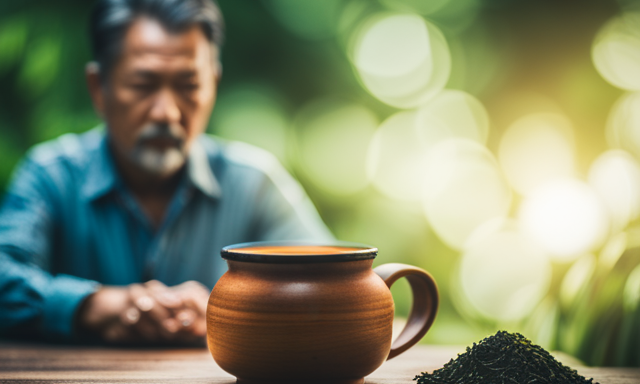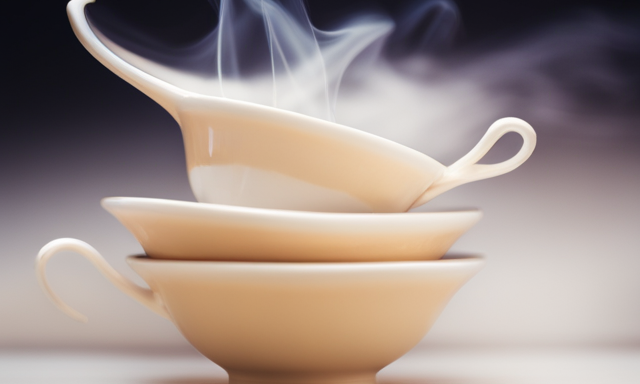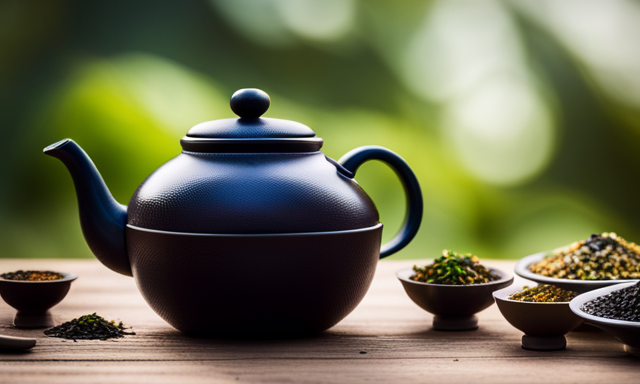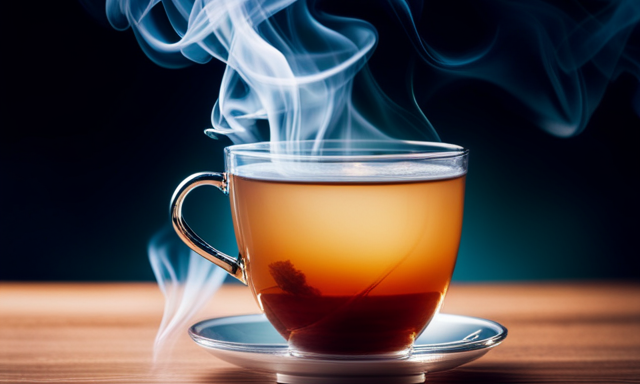As I sit here, sipping on a warm cup of oolong tea, I can’t help but marvel at the countless health benefits this ancient beverage offers.
Oolong tea, with its rich history and unique flavor, has been cherished for centuries for its remarkable ability to promote overall well-being.
From weight loss and improved heart health to enhanced mental alertness and a strengthened immune system, the benefits of oolong tea are truly astounding.
This delightful brew is packed with antioxidants and anti-aging properties, helping to combat the effects of time and reduce the risk of chronic diseases like cancer.
Not only does oolong tea taste exquisite, but it also helps regulate blood sugar levels, making it an ideal choice for those seeking a healthier lifestyle.
So, join me on this journey as we explore the incredible health benefits of drinking oolong tea and discover how this simple beverage can transform your well-being.
Key Takeaways
- Oolong tea promotes skin health by reducing wrinkles, promoting a radiant complexion, and protecting skin cells with antioxidants.
- It helps regulate blood sugar levels, making it suitable for individuals with diabetes, by decreasing blood glucose levels, improving insulin sensitivity, and enhancing glucose metabolism and insulin secretion.
- Oolong tea reduces the risk of chronic diseases, including cancer, by protecting against free radicals, having anti-inflammatory properties, and potentially lowering cholesterol levels and improving blood sugar control.
- It is rich in antioxidants, supports heart health, improves insulin sensitivity, and can help maintain stable blood sugar levels.
A Brief History of Oolong Tea
Oolong tea has a fascinating history that dates back hundreds of years. This tea has its brief origins in China, where it is traditionally produced and consumed. Oolong tea holds great cultural significance in Chinese society, with a rich heritage that includes elaborate tea ceremonies and a deep appreciation for its unique flavor profiles.
The production of oolong tea involves a meticulous process of withering, oxidation, and rolling the tea leaves. This intricate method results in a tea that is partially fermented, giving it a distinct taste and aroma. Oolong tea is loved for its balance of flavors, ranging from floral and fruity to woody and earthy.
With its centuries-old history and cultural importance, oolong tea has become a beloved beverage worldwide. Its unique production process and delightful taste make it a favorite among tea enthusiasts.
Now, let’s delve into the health benefits of oolong tea, starting with how it promotes weight loss and boosts metabolism.
Promotes Weight Loss and Boosts Metabolism
Oolong tea promotes weight loss and boosts metabolism, making it a great addition to a weight management routine. Here are three ways in which this tea can benefit your weight and metabolic health:
-
Boosts fat oxidation: Oolong tea contains polyphenols that activate enzymes responsible for breaking down fat in the body. This aids in the oxidation of stored fat, leading to weight loss.
-
Increases calorie burning: Oolong tea has been shown to increase energy expenditure and boost the body’s metabolic rate. This means you’ll burn more calories throughout the day, even while at rest.
-
Regulates blood sugar levels: Consuming oolong tea helps regulate blood sugar levels, preventing spikes and crashes that can lead to overeating. Stable blood sugar levels are essential for maintaining a healthy weight.
By incorporating oolong tea into your daily routine, you can enjoy its weight management and metabolic benefits. Additionally, oolong tea improves heart health and lowers blood pressure.
Improves Heart Health and Lowers Blood Pressure
Incorporating oolong tea into your daily routine can have a positive impact on your cardiovascular wellness. It can lower blood pressure and improve heart function. Oolong tea contains antioxidants that help reduce hypertension, a major risk factor for heart disease.
Studies have shown that regular consumption of oolong tea can improve cardiovascular health. It does so by reducing the levels of bad cholesterol and triglycerides in the blood, while increasing the levels of good cholesterol. The polyphenols present in oolong tea also help to relax blood vessels, improving blood flow and reducing the strain on the heart.
Additionally, oolong tea has been found to decrease the risk of stroke by preventing the formation of blood clots. With its numerous health benefits, oolong tea is a great addition to your daily routine for a healthier heart.
Transitioning into the next section, oolong tea also enhances mental alertness and focus.
Enhances Mental Alertness and Focus
Sipping on a cup of oolong tea can give your brain a gentle nudge, sharpening your focus and alertness. Oolong tea contains caffeine and L-theanine, which work together to provide mental clarity and enhance cognitive function. Here are five ways oolong tea can boost your mental alertness and focus:
-
Increases brain activity: The caffeine in oolong tea stimulates the central nervous system, improving brain function and increasing alertness.
-
Enhances memory: Studies have shown that oolong tea can improve memory and cognitive performance, making it easier to retain and recall information.
-
Improves attention span: The combination of caffeine and L-theanine in oolong tea helps to improve attention span and focus, allowing you to stay on task for longer periods.
-
Reduces mental fatigue: Oolong tea has been found to reduce mental fatigue and increase mental energy, helping you stay mentally sharp throughout the day.
-
Supports mood regulation: The amino acid L-theanine in oolong tea promotes relaxation and reduces anxiety, which can enhance your overall mood and mental well-being.
With its ability to enhance mental alertness and focus, oolong tea is a delicious and practical way to give your brain a boost.
This sets the stage for the subsequent section about how oolong tea boosts the immune system and fights off infections.
Boosts Immune System and Fights off Infections
Boosting the immune system and fighting off infections, oolong tea provides a natural defense mechanism for your body. This incredible tea is packed with antioxidants that help to strengthen the immune system and protect against harmful pathogens.
The combination of catechins, theaflavins, and thearubigins found in oolong tea work together to enhance the body’s ability to fight off viruses and bacteria. By regularly consuming oolong tea, you can boost your energy levels and improve your overall well-being.
Studies have shown that oolong tea can increase the production of white blood cells, which are essential for a healthy immune system. Additionally, the polyphenols in oolong tea have been found to have anti-inflammatory properties, further supporting your body’s immune response.
Transitioning to the next section about ‘supports digestive health and reduces inflammation’, oolong tea offers a holistic approach to improving your overall health.
Supports Digestive Health and Reduces Inflammation
Who would have thought that a simple cup of oolong tea could be the secret weapon against digestive issues and pesky inflammation? Oolong tea is not only a delicious beverage but also offers numerous health benefits for our digestive system. It contains polyphenols and antioxidants that support digestive health by promoting the growth of beneficial gut bacteria, reducing inflammation, and improving overall digestion. Additionally, oolong tea has been shown to reduce the risk of gastrointestinal disorders like ulcers and acid reflux. Its anti-inflammatory effects can help soothe the digestive tract and alleviate symptoms of bloating and indigestion. By incorporating oolong tea into your daily routine, you can enjoy these digestive benefits and experience relief from inflammation. Speaking of inflammation, oolong tea is also rich in antioxidants and anti-aging properties, making it a fantastic addition to your wellness routine.
Rich in Antioxidants and Anti-Aging Properties
Drinking oolong tea not only supports digestive health and reduces inflammation, but it also offers a wide range of other health benefits. One of the main reasons oolong tea is so beneficial is because it is rich in antioxidants and has anti-aging properties.
These antioxidants help to combat oxidative stress in the body, reducing the risk of chronic diseases and promoting overall health.
Additionally, oolong tea has been found to have anti-inflammatory benefits, which can help to reduce inflammation in the body and alleviate symptoms of conditions such as arthritis.
Furthermore, the anti-aging properties of oolong tea can contribute to healthier and more youthful-looking skin. Regular consumption of oolong tea may help to improve skin health by reducing the appearance of wrinkles and promoting a more radiant complexion.
Moving forward, let’s explore how oolong tea helps regulate blood sugar levels.
Helps Regulate Blood Sugar Levels
Incorporating oolong tea into your daily routine can be very helpful in regulating your blood sugar levels. Oolong tea has been shown to have a positive impact on blood sugar control, making it a great choice for individuals with diabetes or those looking to maintain stable blood sugar levels.
Studies have found that oolong tea can help decrease blood glucose levels and improve insulin sensitivity. This is due to the presence of polyphenols in oolong tea, which have been shown to enhance glucose metabolism and insulin secretion.
By incorporating oolong tea into your daily routine, you can potentially reduce the risk of developing chronic diseases, such as cancer. This transition towards a healthier lifestyle can have numerous long-term benefits for your overall well-being.
Reduces the Risk of Chronic Diseases, such as Cancer
By incorporating oolong tea into my daily routine, I can potentially reduce the risk of developing chronic diseases, such as cancer, while also enhancing my overall well-being.
Oolong tea is rich in antioxidants, which help protect the cells from damage caused by free radicals. These antioxidants have been shown to reduce the risk of various types of cancer, including breast, ovarian, and pancreatic cancer.
Additionally, oolong tea contains polyphenols, which have anti-inflammatory properties and can help prevent chronic diseases like heart disease and diabetes. Studies have also suggested that oolong tea may help lower cholesterol levels and improve blood sugar control.
Drinking oolong tea regularly can be a simple yet effective way to promote good health and reduce the risk of chronic diseases.
Now, let’s move on to some tips for brewing and enjoying oolong tea.
Tips for Brewing and Enjoying Oolong Tea
Indulging in a steaming cup of oolong tea is like capturing the essence of a tranquil garden. The fragrant leaves unfurl in the hot water, releasing their delicate flavors and aromas. To fully enjoy this exquisite tea, here are three tips for brewing and savoring oolong tea:
-
Water temperature: Oolong tea is best brewed with water that is around 180°F (82°C). Boiling water can scorch the delicate leaves and result in a bitter taste. Use a thermometer or simply let the water cool for a few minutes after boiling.
-
Steeping time: The ideal steeping time for oolong tea is between 3 to 5 minutes. Steeping it for too long can make the tea taste bitter, while steeping it for too short a time may not bring out its full flavor. Experiment with different steeping times to find your preferred taste.
-
Tea tasting: To fully appreciate the nuances of oolong tea, try slurping it. This helps aerate the tea, allowing the flavors to fully develop on your palate. Take small sips, allowing the tea to coat your tongue and savor the complex flavors.
By following these brewing techniques and practicing tea tasting, you can fully enjoy the rich flavors and health benefits of oolong tea.
Frequently Asked Questions
Can oolong tea help with skin aging and wrinkles?
Yes, oolong tea can help with skin aging and wrinkles. It contains antioxidants that promote skin rejuvenation and has anti-aging properties. Regular consumption can contribute to healthier and youthful-looking skin.
Does oolong tea contain caffeine?
Yes, oolong tea contains caffeine. It can help with weight loss by boosting metabolism and improving digestion. Studies suggest that oolong tea’s caffeine content may contribute to these health benefits.
Can oolong tea be consumed by pregnant women?
Oolong tea is safe to consume during pregnancy, but it’s important to moderate intake. It can support fertility, but too much caffeine may have negative effects. Consult a healthcare professional for personalized advice.
How does oolong tea compare to green tea in terms of health benefits?
In terms of weight loss, both oolong tea and green tea have potential benefits. Oolong tea may help boost metabolism and fat oxidation, while green tea may increase fat burning and improve insulin sensitivity.
Are there any potential side effects or risks associated with drinking oolong tea?
There are potential allergies to oolong tea, so it’s important to be aware of any adverse reactions. Additionally, oolong tea may affect blood pressure levels, so it’s recommended to monitor it if you have hypertension.
Conclusion
Overall, the health benefits of drinking oolong tea are remarkable.
From promoting weight loss and improving heart health to enhancing mental alertness and boosting the immune system, oolong tea is a powerhouse of health.
With its rich antioxidants and anti-aging properties, it can also help regulate blood sugar levels and reduce the risk of chronic diseases like cancer.
So, sip on this sensational tea and savor its numerous health perks.
It’s a simple, satisfying, and scientifically-supported way to stay healthy and happy!










